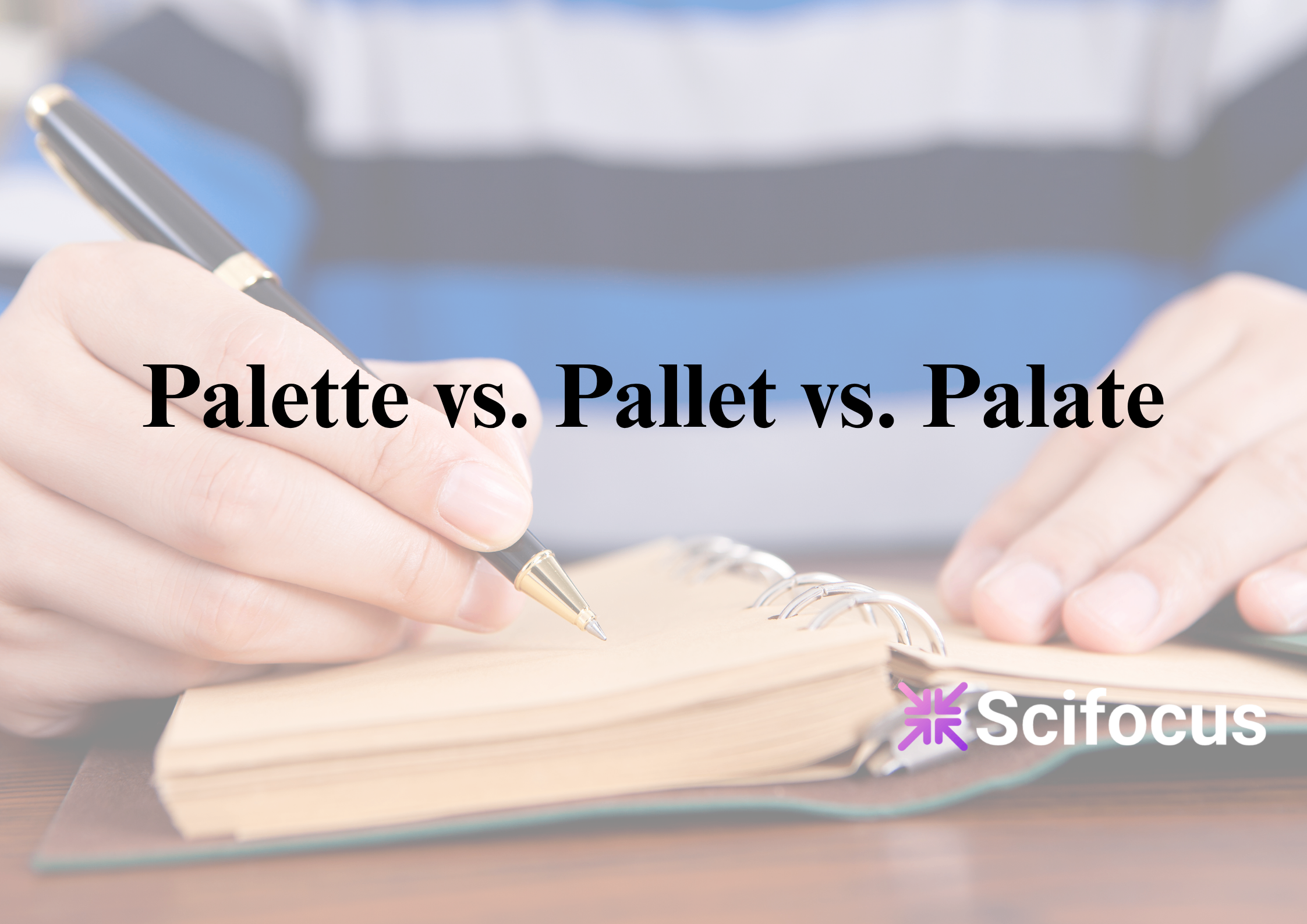Palette vs. Pallet vs. Palate: Why They Sound the Same but Mean Wildly Different Things

Ever stared at a word and thought, "Wait, have I been using this wrong my whole life?" Yeah, us too. And few word trios cause more confusion than palette, pallet, and palate. They're homophones (they sound the same) but they're definitely not interchangeable. If you've ever hesitated mid-sentence wondering if your taste buds belong on a "palette," you're not alone.
So let’s untangle this colorful mess, one word at a time.
Palette: Think Paint, Think Color
Picture a painter holding a flat board smudged with colors. That’s a palette. It’s both literal—the tool artists use to mix paints—and metaphorical. In writing, music, or design, we talk about a “color palette” or “musical palette” to describe a range of options or tones.
Examples:
- She mixed warm tones on her palette to create a sunset.
- The website design uses a muted color palette to feel calming.
It's artsy, it's creative—it’s all about variety and expression.
Pallet: Warehouse Vibes and Rough Wood
Now shift gears. Pallet is the blue-collar cousin. It's that rough, flat wooden platform you see in warehouses, used for stacking boxes or loading goods onto forklifts. Nothing artsy here—just pure logistics.
Examples:
- The shipment was loaded onto a pallet for transport.
- He built a garden bench from recycled pallets.
Fun twist? In old-school usage, a pallet could also mean a straw-filled mattress. Yep, your medieval floor-bed might’ve been called a pallet. Cozy, right?
Palate: The Taste Test
Now to the one that gets misused the most: palate. Your palate is part of your mouth—literally the roof—and it’s also your sense of taste. When someone says you have a “refined palate,” they mean you have a sharp, sensitive sense for flavors, like a foodie or wine critic.
Examples:
- Her palate was so refined, she could taste hints of oak in the wine.
- Spicy food doesn't suit my palate.
So, no—you don’t have a “taste palette.” That’s like calling your brain a spreadsheet.
Why Do We Mix Them Up So Much?
Blame it on English. We’ve got homophones coming out our ears. Add autocorrect and fast typing into the mix, and suddenly you're praising someone's "spicy pallet." Awkward.
And hey, sometimes the mix-ups are funny. Like when someone says, “I’ve got a sweet palette.” Do they mean their color scheme is sugary? Probably not.
The confusion isn’t just verbal—it slips into writing all the time. Especially in essays. Especially when you're trying to sound smart.
Taste Palette vs. Palate: A Quick Reality Check
Let’s clear something up once and for all: there’s no such thing as a “taste palette.” If you're talking about flavors, spices, or how your grandma can smell cumin from a mile away—you want palate.
However… “palette” can show up in a food context—but visually. A “palette of flavors” is metaphorical, usually describing a colorful or artistic food arrangement. But even then, most editors will prefer palate.
So if in doubt, stick with palate when you're talking about taste. Save palette for colors and creativity.
When a Word Feels Wrong, It Probably Is
You know that little itch in your brain when a word looks off in a sentence? Trust it. If you write, “I love Thai food because I have a diverse palette,” and something feels off—it’s because your brain’s trying to tell you you’re holding a paintbrush, not chopsticks.
Don’t beat yourself up though. Native speakers mess this up too.
Real-Life Examples to Burn These Into Your Brain
Let’s take a few example sentences that get this wrong and fix them:
Wrong: I’ve always had a very picky palette.
Right: I’ve always had a very picky palate.
Wrong: We picked a minimalist palate for our living room.
Right: We picked a minimalist palette for our living room.
Wrong: The boxes were stacked on a wooden palette.
Right: The boxes were stacked on a wooden pallet.
Just tiny changes, but they make a world of difference.
Okay, but What If I'm Still Confused?
Honestly? Bookmark this page. Or jot the meanings down like this:
- Palette = Paint
- Pallet = Platform
- Palate = Taste
They all start with “pal,” but only one of them cares about your sushi preferences.
Final Thoughts (That Might Save You on Your Next Essay)
Words matter. Whether you're writing an essay, designing a mood board, or literally trying to stack boxes—you want to use the right word. Misusing palate for palette might seem small, but it can be jarring, especially in academic writing. It’s like wearing sneakers to a black-tie event. Functional? Sure. But... also kinda wrong.
If you're a student, this trio is one of those things your professor might mark you down for. Not out of cruelty—just because it shows you weren’t paying close attention. And you want to sound sharp, right?
You don’t need to memorize the dictionary. Just remember: taste, color, crates.
Oh, and speaking of writing with precision—if you want to avoid embarrassing grammar errors in your next essay, check out Scifocus’s Grammar Checker. It’s fast, smart, and honestly a lifesaver when you're too tired to spot mistakes. Or explore more of what Scifocus can do to support your academic journey.
FAQs
Is it “taste palette” or “taste palate”?
It’s “taste palate.” The word refers to your sense of taste. “Palette” is for colors or art.
Can “palette” ever be used in a food context?
Rarely, and only metaphorically—like a chef describing a “palette of flavors,” but even then, “palate” is more accurate.
What’s the difference between “palette” and “pallet”?
“Palette” is for art and colors. “Pallet” is for shipping and warehouses. Think: brush vs. forklift.
How do I remember which one to use?
Try this: palette = paint, pallet = platform, palate = taste. Easy mnemonics help.
Are these mistakes common in essays?
Absolutely. They’re some of the most commonly confused homophones in academic writing. Always double-check if you're unsure.
Did you like this article? Explore a few more related posts.
Start Your Research Journey With Scifocus Today
Create your free Scifocus account today and take your research to the next level. Experience the difference firsthand—your journey to academic excellence starts here.
